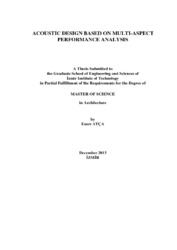Please use this identifier to cite or link to this item:
https://hdl.handle.net/11147/3670Full metadata record
| DC Field | Value | Language |
|---|---|---|
| dc.contributor.advisor | İlal, Mustafa Emre | - |
| dc.contributor.author | Atça, Emre | - |
| dc.date.accessioned | 2014-07-22T13:52:06Z | - |
| dc.date.available | 2014-07-22T13:52:06Z | - |
| dc.date.issued | 2013 | - |
| dc.identifier.uri | http://hdl.handle.net/11147/3670 | - |
| dc.description | Thesis (Master)--İzmir Institute of Technology, Architecture, İzmir, 2013 | en_US |
| dc.description | Includes bibliographical references (laves: 55-56) | en_US |
| dc.description | Text in English; Abstract: Turkish and English | en_US |
| dc.description | x, 65 leaves | en_US |
| dc.description.abstract | In current architectural practice, architects, due to time and budget constraints do not analyse their designs and evaluate alternatives from the building physics perspective. They expect this analysis to be carried out by engineers. Unfortunately, engineers mostly get involved late in the design process, after many key decisions are already finalized, leaving them powerless to solve problems employing efficient strategies. However, the rapid advances both in computing and engineering have produced various simulation based tools for evaluating building performance that architects themselves can employ in the early design stages. The proliferation of the utilization of these tools throughout the architectural practice and education is necessary for achieving higher performance levels in the built environment. In this study, the main Lecture Hall at Izmir Institute of Technology, Department of Mathematics is diagnosed and documented through measurements and the possibility of predicting this existing level of performance through simulations during the design stage is explored. The brand new Lecture Hall is in urgent need of renovations, with additional costs, in order to improve acoustic, visual and thermal comfort in the space. Architects need to follow a performance based design approach where they consider performance criteria and utilize building simulation tools for design support in order to avoid problems that introduce costs later in the construction and operation of buildings. | en_US |
| dc.language.iso | en | en_US |
| dc.publisher | Izmir Institute of Technology | en_US |
| dc.rights | info:eu-repo/semantics/openAccess | en_US |
| dc.subject.lcsh | Architectural acoustics | en |
| dc.subject.lcsh | Architecture and energy conservation | en |
| dc.title | Acoustic Design Based on Multi-Aspect Performance Analysis | en_US |
| dc.type | Master Thesis | en_US |
| dc.institutionauthor | Atça, Emre | - |
| dc.department | Thesis (Master)--İzmir Institute of Technology, Architecture | en_US |
| dc.relation.publicationcategory | Tez | en_US |
| dc.identifier.wosquality | N/A | - |
| dc.identifier.scopusquality | N/A | - |
| item.openairecristype | http://purl.org/coar/resource_type/c_18cf | - |
| item.cerifentitytype | Publications | - |
| item.fulltext | With Fulltext | - |
| item.languageiso639-1 | en | - |
| item.grantfulltext | open | - |
| item.openairetype | Master Thesis | - |
| Appears in Collections: | Master Degree / Yüksek Lisans Tezleri Sürdürülebilir Yeşil Kampüs Koleksiyonu / Sustainable Green Campus Collection | |
Files in This Item:
| File | Description | Size | Format | |
|---|---|---|---|---|
| 10024921.pdf | MasterThesis | 3.06 MB | Adobe PDF |  View/Open |
CORE Recommender
Page view(s)
436
checked on Apr 28, 2025
Download(s)
3,708
checked on Apr 28, 2025
Google ScholarTM
Check
Items in GCRIS Repository are protected by copyright, with all rights reserved, unless otherwise indicated.